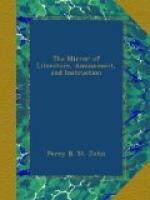“Flows and as it flows, for ever may flow on;”
or the port that warms you indeed: yes, into a bilious headach and a low fever. Yet all these things are pleasures!—parts of social enjoyment! They fill out the corners of the grand world—they inspire the minor’s dreams—they pour crowds into St. James’s, Doctors’ Commons, and Melton Mowbray—they——Oh! confound them all!—it bores one even to write about them.
Only just returned to London, and, after so bright a panegyric on it, I already weary of the variety of its samenesses. Shall I not risk the fate of Faust, and fall in love—ponderously and bona fide? Or shall I go among the shades of the deceased, and amuse myself with chatting to Dido and Julius Caesar? Verily, reader, I leave you for the present to guess my determination.
* * * * *
DOMESTIC HINTS.
* * * * *
WASTE OF BONES
Is at all times reprehensible, but more especially as they are employed as a manure for dry soils, with the very best effect. They are commonly ground and drilled in, in the form of powder, with turnip seed. Mr. Huskisson estimated the real value of bones annually imported, (principally from the Netherlands and Germany) for the purpose of being used as a manure, at 100,000_l._; and he contended that it was not too much to suppose that an advance of between 100,000_l._ and 200,000_l._ expended on this article occasioned 500,000 additional quarters of corn to be brought to market.—Loudon’s Encycl. Agricult.
* * * * *
GOOD FLOUR.
According to the assize acts, a sack of flour weighing 280 lbs. is supposed capable of being baked into 80 quartern loaves; one-fifth of the loaf being supposed to consist of water and salt, and four-fifths of flour. But the number of loaves that may be baked from a sack of flour depends entirely on its goodness. Good flour requires more water than bad flour, and old flour than new flour. Sometimes 82, 83, and even 86 loaves have been made from a sack of flour, and sometimes hardly 80.
* * * * *
LEGAL ADULTERATION OF BREAD.
Within the city of London, and in those places in the country where an assize is not set, it is lawful for the bakers to make and sell bread made of wheat, barley, rye, oats, buckwheat, Indian corn, peas, beans, rice, or potatoes, or any of them, along with common salt, pure water, eggs, milk, barm, leaven, potato or other yeast, and mixed in such proportions as they shall think fit. (3 Geo. IV. c. 106, and 1 and 2 Geo. IV. c. 50.)




